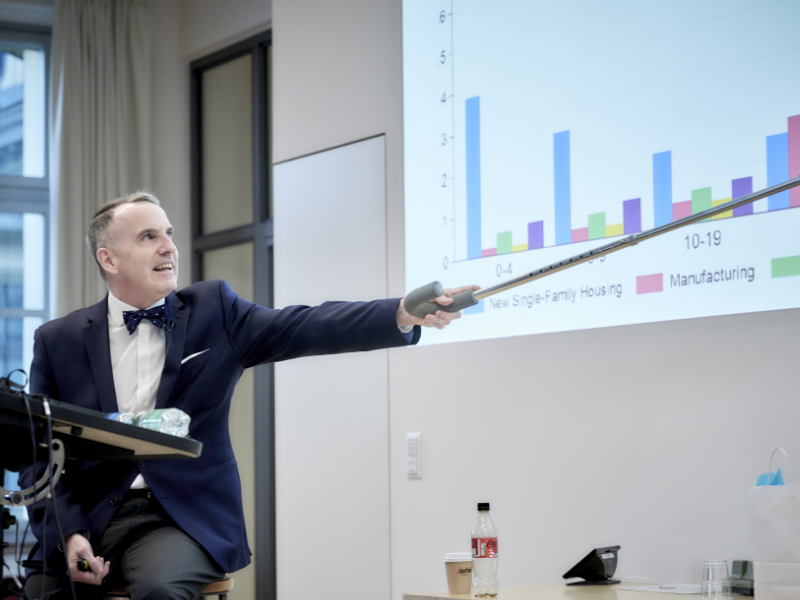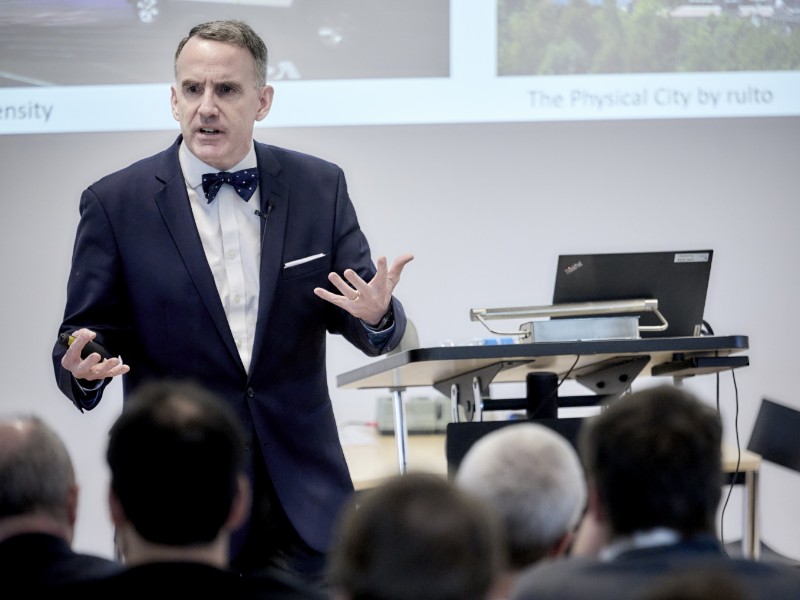Guest lecture
Edward L. Glaeser asks: what makes cities competitive?
In a lecture at the University of Bern, American economist Edward L. Glaeser discussed the question of how cities can better prepare for challenges. After all, urbanization is increasing, which means there is a need for sufficient housing and efficient infrastructure.

Here in Bern, the prospect of Switzerland becoming a country of ten million people has been in the news. The world’s population is also increasing – and concentrating primarily in cities. In 2008, half the population lived in urban centers. By 2050, it is expected to be more than two thirds. In many places, however, housing and infrastructure are failing to keep pace with the rising demand. In a lecture on December 6th, American urban economist Edward L. Glaeser discussed the possible consequences. Glaeser is the author of 14 non-fiction books and releases several scientific publications on this subject every year. .
He was invited to speak by the Department of Economics at the University of Bern. The Harvard professor led the auditorium through several highlights from his research projects and presented a number of his findings – often with a dose of humor.
The US real estate industry: inhibited and fragmented
Glaeser devoted his initial focus to housing construction in the USA, an area that has been plagued by disorder for decades. According to Glaeser, a key reason why the number of newly built residential properties has failed to keep up with demand is overregulation. This is often due to public authorities’ unwillingness to allow new housing to be built in the first place. Excessive legislation has stunted the growth of the industry, preventing the construction of new homes on a scale that would significantly reduce construction costs. Yet, according to Glaeser, nation states with well-developed democraties and reliable jurisprudence actually have less need for legislation than unstable emerging countries, which are more prone to corruption. Using the example of Houston, Texas, the only city in the USA without a zoning plan, Glaeser shows how a liberal approach allows the housing market to self-regulate: “In Houston, the supply of housing has always been in line with demand.”
«When the big players are missing, big projects are rarely implemented»
Edward Glaeser
A look at patent statistics reveals that the US real estate industry is also falling behind technologically. While the number of new patents in the industry and construction sectors grew steadily throughout the sixties, the early seventies brought an abrupt halt to the trend. From that point on, the manufacturing industry continued to file increasing numbers of patents, while the construction industry stagnated. According to Glaeser, the sluggish nature of the construction industry in the USA is also indicated by the fact that most construction firms are extremely small, with the lion’s share accounted for by micro-enterprises with four employees or fewer. “When the big players are missing, big projects are rarely implemented.”
Research results provided by Uber vehicles
In addition to the construction of buildings, Glaeser has also studied road building. In the USA, highways fall under the purview of the federal government and are well-maintained. In the case of lower-ranking roads, though, the situation is very different. These are the responsibility of the individual states and counties, which frequently find themselves grappling with major investment backlogs. Yet when the repairs actually take place, in many cases, the most urgent roads don’t come first: “Our investigations showed that there is no correlation between the need for maintenance and the order in which roads are repaired,” explained Glaeser, to the astonishment of the packed auditorium.

Potholed roads aren’t just unpleasant, they are also costly. When drivers are forced to slow down all the time because of crumbling asphalt they lose time, which has a negative impact on the economy as a whole. To quantify this impact in detail, Glaeser conducted a survey asking drivers about their braking behavior in response to poor-quality road surfaces. The resulting overall cost came out to $1.30 per person per day. That may not sound like much, but this phenomenon affects vast numbers of commuters. Using sensors installed in Uber vehicles, the research teams were also able to find out just how bumpy the roads were.
Overly complex tenders as cost drivers
Glaeser also took public procurement to task. Public authorities rely too little on pragmatic, cost-effective solutions. Taking the example of buses, he showed that on average, cities in the US pay four times more than necessary in order to buy a comfortable vehicle. In this area, many cities have created very specific sets of criteria and requirements. The suppliers therefore offer them products that are precisely tailored to their requirements. But the procedure and the necessary refinements make the buses unnecessarily expensive. “It’s like going to a car manufacturer and describing exactly what kind of car you want, regardless of what they have in their range. This approach results in the production of a very expensive, one-off vehicle.” If, on the other hand, the federal government were responsible for the procurement of the buses and put them out to international tender, the products delivered wouldn’t be any inferior and would only be a fraction as expensive. “Of course, the cities would still have to decide on the buses’ livery, though” quipped Glaeser.
Infrastructure affects health and education
Turning to an international research project, Glaeser highlighted the far-reaching consequences that poorly-maintained municipal infrastructures can have. In Lusaka, the capital of Zambia, the notorious interruptions to the supply of drinking water aren’t just leading to increasing incidences of infectious diseases such as diarrhea. They have also seen increasing numbers of families resort to traditional patterns of behavior, with girls and young women being made to fill up containers at public faucets. The trips to and from the faucets can take several hours a day: time that the girls would far better spend learning, with many of them missing out on school as a result.

The Harvard professor blamed public mismanagement for many of these problems, from slow provision of housing to failed or delayed road maintenance and inefficient tendering procedures. In Switzerland, too, criticism against the legal jungle and against the flood of regulations is ubiquitous. Glaeser didn’t comment directly on the situation in Switzerland. Yet there are certainly countries that are doing better than the USA in terms of urban development and infrastructure. Glaeser made specific reference to Seoul and Tokyo, where it has also been possible to provide decent homes to people with lower incomes. “Despite this, these cities are attractive places for people from every income bracket.”
A long-term exchange with the University of Bern
Glaeser’s appearance in Bern wasn’t just due to the Doctor Honoris Causa that he was awarded on Saturday (see box), but also because the Department of Economics has been in close contact with him for some time. According to Maximilian von Ehrlich, Professor of Economics, regional and urban economics are the main subjects of the exchange between the Department of Economics and Glaeser – although the University of Bern invariably focuses on the situation in Switzerland first. “The observation that the US construction industry isn’t very innovative should also give us pause for thought, however.” After all, this industry is internationally networked, and the effect of shortfalls in innovation could also be felt here in Switzerland. Another discussion point is the question of whether the state sector could be more efficient in the awarding of contracts.
“I like the freedom to build high-rise buildings”
Glaeser is known as an advocate of high-rise buildings. In his own words: “I don't necessarily love high-rise buildings. Above all else, I like the freedom to build high-rise buildings.” Glaeser believes it should be possible to transform cities for the future in such a way that they can meet the increasing demand for housing. Yet, as Glaeser also adds, “Zurich isn’t Seoul.” He also keeps his distance from the idea of forcing people away from beloved suburban homes and into inner-city skyscrapers. “It is much more important to reduce misincentives in the form of subsidies, for example, and to encourage specific developments that way,” says Glaeser. As an example, he cites the US legislation that favors people buying homes over renting them: “This should simply be abolished.” In addition to this, publicly funded road building supports decentralization and sprawl. “In the era of climate change, living so spread out and encouraging freeways makes no sense.”

Are high-density residential complexes really attractive? “I trust the investors to build high-rise complexes that are both safe and comfortable. Dysfunctional residential complexes only arise where the state acts as the developer,” explained Glaeser, referring to the dismal satellite towns prevalent in Eastern Europe. For Glaeser, prefabricated buildings of this kind serve to justify his deep sense of skepticism toward the State as a developer.
Doctor Honoris Causa of the Faculty of Business, Economics and Social Sciences
On Saturday, together with six others, Edward L. Glaeser was awarded the title of Doctor Honoris Causa of the University of Bern. Glaeser was honored for his pioneering research in the fields of the urban, regional and political economy, and particularly for his work studying cities as drivers of growth and innovation. His inspiring and influential initiatives for numerous scientists in the area of urban and regional economics were also honored, as were his many years of dedicated work as an editor on leading specialist journals.
Subscribe to the uniAKTUELL newsletter

Discover stories about the research at the University of Bern and the people behind it.